Should you feed birds in your garden? Absolutely! Feeding birds in your garden is great fun and a way of giving a little back to nature. At the same time, encouraging birds into your garden means you may spot new birds you haven’t seen before, without leaving home or spending too much cash in the process.
Many of us enjoy throwing out a few crumbs for birds, but knowing what to feed garden birds with, and what to avoid, is essential to their health.
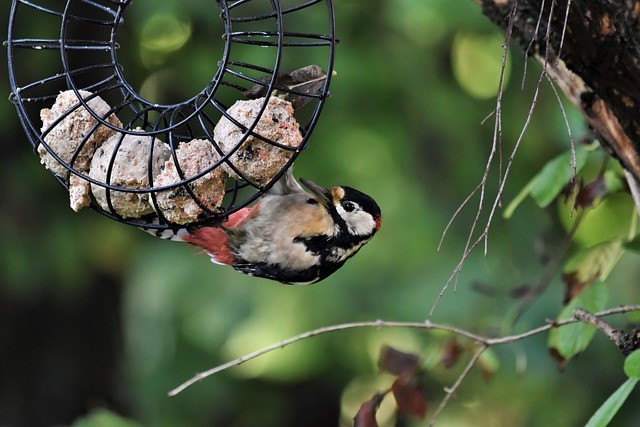
Why Feed Garden Birds?
Encouraging wild birds into your garden not only helps you and your family get a taste of the vast variation of birds here in the UK, but you can make a difference to the birds themselves which in recent years have shown a massive decline in many popular species.
The best bird feeds attract a wide variety of different species into your garden. It gives them a way to supplement their natural food sources, especially in hard times of winter, droughts or when they are rearing their young.
Feeding garden birds gives our feathered friends the best possibilities to increase their numbers, and gives many species the a chance of bouncing back from the slippery slope of endangerment.
Not all food is good for birds. Many of us grew up throwing out bread scraps, not realising these foods filled up their belly’s without giving them the nutrition and calorie rich foods they need to survive and thrive. The best bird feeds supply all the fats, proteins and other nutrient dense foods needed for their survival in small, easy to eat forms.
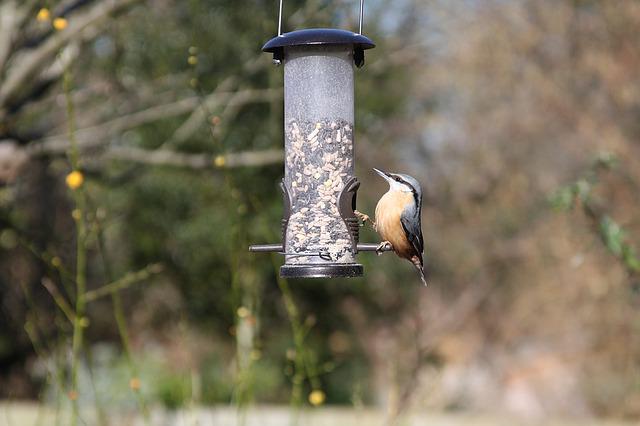
Should I Feed British Birds All Year Round?
We all know the importance of putting food out in the winter when food is scarce. But, in recent years, its been found that all-year-round feeding is needed for many different reasons.
Why Feed Birds in Spring?
In spring, food and water helps parenting birds to find suitable calories and gives the potential for more chicks to make it through this tough period. Some foods, like whole peanuts, can be a choking hazard to young birds so care must be taken when choosing the right foods to feed birds with in spring.
Why Feed Birds in Summer?
Summer can also be a challenging time for garden birds. Although many foods are abundant, dry hard ground can cause birds to dehydrate, both through lack of drinking water as well as juicy, fat-rich foods like earthworms being below a tough ground covering.
Another thing to consider in summer and autumn is the arrival of migrant species that after a long journey will be especially grateful for a calorie dense feed or two, as well as our home grown birds wanting to add weight for the cooler months.
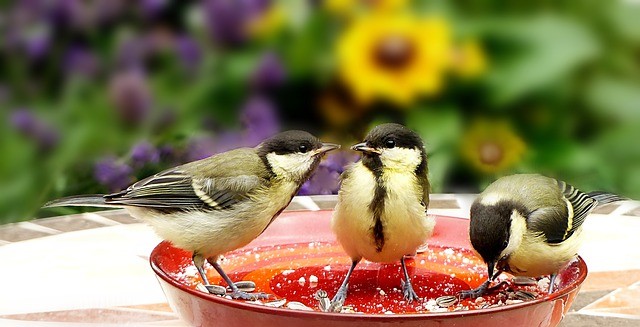
Finally, in late summer the birds are moulting, shedding their breeding colours and preparing for the tough winter months. This process that takes a lot of energy, and garden feeding can give much need calories and nutrition to help aid this process.
Alongside putting out food, an important way to help birds (as well as other wildlife) is by planting a wildlife friendly environment of lawns and shrubs. This add vitamins and other natural nutrition that the feeds alone can’t deliver. Another essential part of a bird-friendly garden is to have a water source in the form of a bird bath, shallow pond or watering bowl on your feeding station.
So, what are the best foods for garden birds? Let’s take a look.
The Best Foods for Garden Birds
Throughout the year, its a good idea to offer a variety of choices at anytime for the birds. The important thing is to stay consistent with the feeding. Sporadic feeding or changing foods too often doesn’t allow the birds to adjust.
A good routine will allow the birds to know exactly where they can get certain foods at anytime. Bear in mind it can take time for birds to find and adjust to you feeding, so be patient and a wide variety will find your feeders. You will then have regular visitors daily, with occasional exciting new birds that appear out of nowhere.
Always remember to add a water source to your feeders too, in the form of a bird bath or shallow bowl (many feeder stations have a water bowl attachment) and remember to clean feeders and water bowls regularly for the birds health.
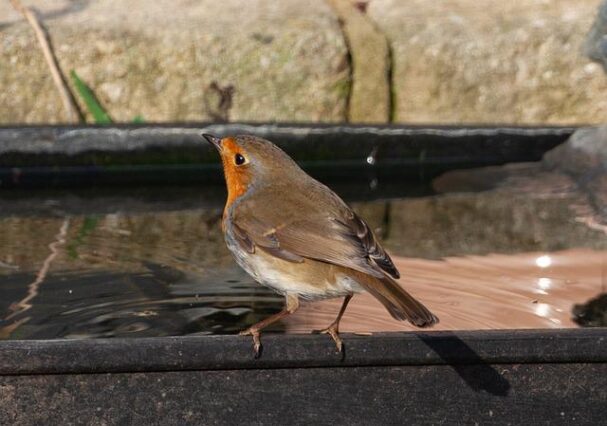
If you’ve been wondering what to feed garden birds, here are a few of the best types of bird food. I’ve included the pros and cons, as well as personal observations that I’ve made over the years.
Sunflower seeds – These can be purchased as either black seeds or as sunflower hearts. The black sunflower seeds have a higher oil content than the striped variety, but the husks can be rather messy. The sunflower hearts (a de-husked type) are be cleaner and easily available. They are very popular with a wide variety of birds, including Goldfinches, Greenfinches, and all the regular Tits.
Scattering sunflower seeds on the ground means the more feeder-shy species like Dunnock, Robins and Blackbirds will enjoy them too. Sunflower hearts are a staple food for my birds throughout the year and a must if you want to encourage a variety of bird species to your garden.
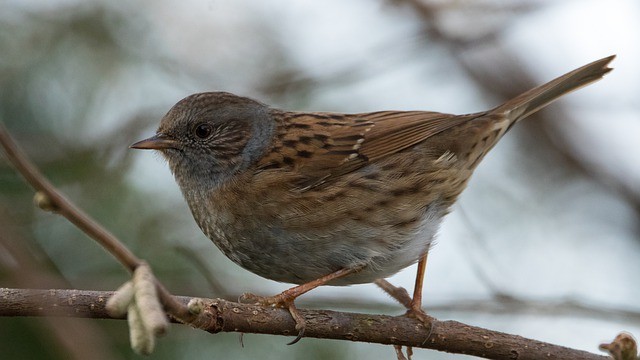
Niger seeds – Like black sunflower seeds, Niger seeds can be messy. Goldfinches do like them but tend to split them out of their husks, leaving a hard mess of husks that set in lumps that have to be chiselled off. But, they are highly nutritious, have a high oil content and are rich in fat. One thing to bear in mind is that a particular feeder is needed due to their small sizes.
Peanuts – A popular bird food that has been put out for bird for decades. It’s advisable to either purchase crushed peanuts or get the classic peanut feeders, to avoid giving birds access to whole peanuts, which can be a choking hazard.
Avoid putting out the plastic net bags these nuts sometimes come in, as these are known to trap and kill many birds. Wire feeders allow the birds to peck through the holes, making them safer for small or young birds.
Peanuts are an amazing source of proteins and fats for birds, and are popular with Tit species. I regularly see Coal Tits collecting and hoarding nuts in crevices around the garden, their natural larder stores.
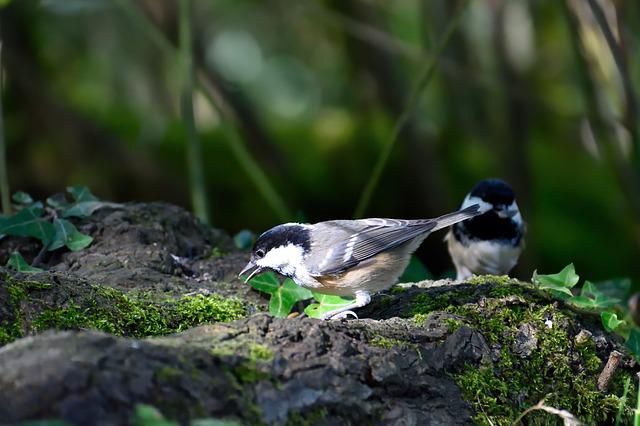
Look for peanuts that have been tested for aflatoxin, a natural toxin in peanuts that can kill birds. Under no circumstances feed your birds with salted or coated human snacks, as birds can’t process the salt content. It is best to keep to natural and untreated varieties.
Insects – Mealworms are an easy to purchase, especially in a dried format. However, if not purchased from a reputable source, there may be some potential pitfalls, such as Salmonella. Mealworms are best soaked as they tend to be dry, but are a love for many species like Robins, Wagtails and Blue-Tits.
Alternatives like waxworms or earthworms can be expensive, but I usually add them occasionally alongside my regular feeds as a treat. They won’t last long in the feeder before they are all eaten, usually less than an hour after being spotted!
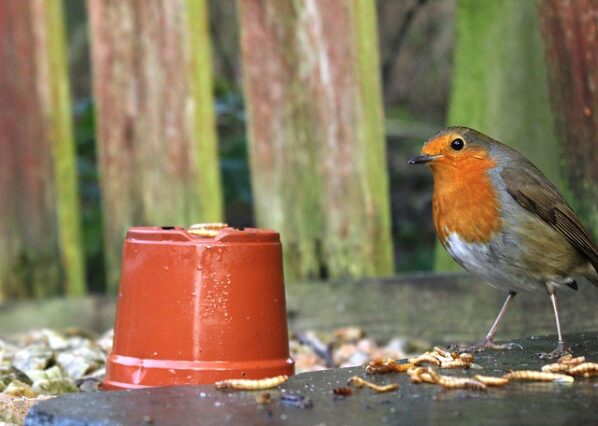
Mixed Seed – There are many different types of mixed seeds out there. The better ones have flaked maize, sunflower seeds, chopped peanuts, coarse cut oats, dried mealworms and suet pellets to add texture and flavour, plus a good mix of nutrition.
For gardeners worried about germination or mess, there are many no-mess or no-grow seeds which have been roasted, ground or cracked open (or de-husked) to help with the problems of plants appearing below feeders.
Avoid mixes with wheat and barley as they are only really suitable for pigeons and pheasants. More importantly, avoid mixes that have split peas, lentils, dried rice and beans. These are often added to cheaper mixes to bulk up the content.
Some bird feed mixes also have dried fruits and berries, which can add some much needed vitamins and nutrition, but these can come with a premium. As mentioned before, avoid mixes with whole peanuts when putting out in spring and summer.
Fat Balls – Fat balls are a popular and important food for garden birds, especially in the cold winter months and during breeding season.
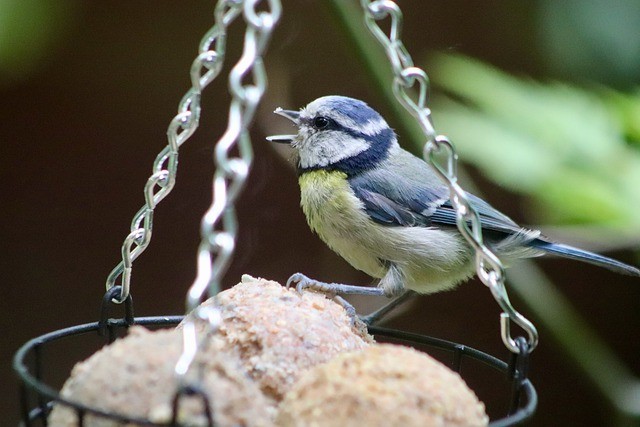
Fat balls usually made from suet or lard and can include seed, grains, nuts or insects. If you’re looking for what to feed wild birds from the kitchen, you can make you own homemade fat balls. They are also available to purchase from suppliers. One important aspect with shop purchased fat balls is that you remove the net before putting them out, as these can trapped the birds and has been know to cause deaths.
Many metal fat ball feeders are available for this food choice. Keep fat balls cool if storing in the warmer weather, as they tend to go rancid in the summer months. Fat balls are an important food for your garden birds in the winter, and a must-have for a complete feeding option.
Other food types – There are many other potential food sources to feed garden birds, such as soaked dry currents, sultanas and raisins, as well as half chopped soft apples, pears and grapes.
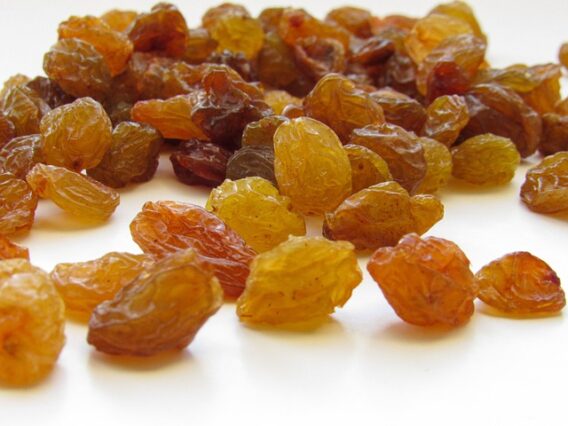
You can give fresh coconut in the shell, but its best to wash off the milk beforehand as this can go bad fast.
Cold, opened baked potato can be another source of fats and happily enjoyed by birds, but apart from gulls at the seaside, chips are rarely eaten!
What Foods are Bad for Garden Birds?
- Seasoned, salted (birds are unable to metabolise salt) or heavily processed products are a no-no for wild birds throughout the year.
- Whole peanuts
- Large chunks of bread
- Desiccated coconut is also a poor choice, as can expand inside the birds and cause death.
- Fermented dairy products like cottage cheese – some birds can tolerate fermented dairy, but others can’t. It is such a minefield, that its best to avoid as a whole and not take the risk.
- Biscuits, crisps and cakes are also a poor choice as they contain many harmful additives and could also cause a choking hazard with little nutrition benefits in the process.
- Tinned meaty dog and cat food can be put out for birds as a substitute for earthworms. Although, if you want to feed garden birds without attracting rats, cats, gulls and other predators, use with caution
Bringing birds into your garden is an amazing way to see the widest variety of wildlife available in the UK. We have some 6oo or so varieties of domestic and migrant visitors. Why not help these beautiful, feathered wonders by giving a helping hand in these tough times? You’ll also have a chance to spot a new bird or three!
When feeding UK birds in your garden, my personal choice is to add sunflower hearts with a good mixed feed. Add some variety of fruit or insects in the warmer months, and fat balls in the winter.
Make sure to add a water supply of some sort, and keep those feeders and containers, clean and disease free as you go. Also, if your garden allows, plant some bird and other wildlife-friendly plants that can supply a fresh food source as well as adding colour and beauty to your borders.
